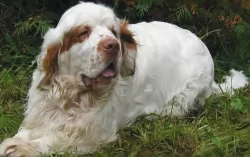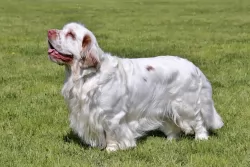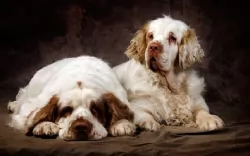 MyDogBreeds
MyDogBreeds Labradoodle is originated from Australia but Clumber Spaniel is originated from United Kingdom. Labradoodle may grow 12 cm / 5 inches higher than Clumber Spaniel. Labradoodle may weigh 9 kg / 19 pounds lesser than Clumber Spaniel. Both Labradoodle and Clumber Spaniel has almost same life span. Both Labradoodle and Clumber Spaniel has almost same litter size. Labradoodle requires Moderate maintenance. But Clumber Spaniel requires High maintenance
Labradoodle is originated from Australia but Clumber Spaniel is originated from United Kingdom. Labradoodle may grow 12 cm / 5 inches higher than Clumber Spaniel. Labradoodle may weigh 9 kg / 19 pounds lesser than Clumber Spaniel. Both Labradoodle and Clumber Spaniel has almost same life span. Both Labradoodle and Clumber Spaniel has almost same litter size. Labradoodle requires Moderate maintenance. But Clumber Spaniel requires High maintenance
 The Labradoodle is certainly a popular cross breed dog which was developed originally in Australia to be a hypoallergenic guide dog.
The Labradoodle is certainly a popular cross breed dog which was developed originally in Australia to be a hypoallergenic guide dog.
The dog is a cross between a Labrador and a Poodle, possessing some of the excellent characteristics from each dog while also being a low shedding dog.
The Labradoodle became known in 1988 when an Australian breeder, crossed the Labrador Retriever and Standard Poodle. The success of the dog led other breeders to begin breeding with Labradors and Poodles, with breeders wanting to move the dog from hybrid to official breed status. As of today, the Labradoodle isn’t recognized as a breed by the American Kennel Club.
 Ever since winning in Confirmation at Westminster Kennel Club’s annual show, the popularity of the Clumber Spaniel has increased markedly. The breed of Clumber Spaniel comes from the United Kingdom and it is the largest of all the spaniels. The breed is named for the Clumber Park where it was developed in Nottinghamshire. The Clumber Spaniel a=was designed to be a gundog or hunter in heavy weeds or cover. They have been popular with the Royal Family and were kept by King George V, King Edward VII, and Prince Albert.
Ever since winning in Confirmation at Westminster Kennel Club’s annual show, the popularity of the Clumber Spaniel has increased markedly. The breed of Clumber Spaniel comes from the United Kingdom and it is the largest of all the spaniels. The breed is named for the Clumber Park where it was developed in Nottinghamshire. The Clumber Spaniel a=was designed to be a gundog or hunter in heavy weeds or cover. They have been popular with the Royal Family and were kept by King George V, King Edward VII, and Prince Albert.
It is possible that during the French Revolution, the Duc de Noailles gave his spaniels to the Duke of Newcastle in Nottinghamshire, These spaniels, Alpine Spaniel, are extinct. At the time they were bred with Basset Hounds and Great Pyrenees.
Another line of thought has the Clumber Spaniel descending form an ancient Bleinheim Spaniel, which was used to later develop the King Charles Spaniel.
Whichever theory is true, we know that they were first bred and improved by William Mansell. They were shown in 1859 in England. They were bred almost exclusively by nobility until the mid-19th century. Then World War 1 caused all breeding to be discontinued and the number of Clumbers declined drastically, only to be redeveloped after the was by King George V.
The Cumber won Best in Show at the prestige’s Crufts 1991 Centenary Show. When the American Kennel Club recognized the Clumber Spaniel, there were only 9 other breeds officially recognized. They came to Canada in the same year of 1884. They are also recognized by the UK Kennel Club as a Vulnerable Native Breed. A Clumber bred by Doug Johnson won Best in Show at the 1996 Westminster Dog Show.
The Clumber Spaniel is a loyal, gentle soul who is not very friendly with strangers. They shed all the time and snore loudly.
 The Labradoodle can come in different sizes – miniature, medium and standard. The standard Labradoodle is a large dog which stands at 53 to 63cm and weighs 23 to 30kg.
The Labradoodle can come in different sizes – miniature, medium and standard. The standard Labradoodle is a large dog which stands at 53 to 63cm and weighs 23 to 30kg.
The coat also differs and it can be made up of tight curls or it can be thick and wavy or even straight. The coat is of medium length and is available in lots of colors – cream, apricot, black, whitish, brown and even a brindle color.
Strong and muscular, he has floppy ears and the tail which was once docked, is left long these days and hangs down or it can be carried somewhat upright and curved.
Known as a designer breed, your Labradoodle is sure to be nothing but a pleasure for you, being a 100% companion dog.
Because he comes from two popular dog breeds of which each possess some exceptional characteristics, your Labradoodle could inherit any or all of the characteristics from one or both dogs. He has also been bred to be a hypoallergenic dog which means you aren’t going to have to worry about too much hair flying around. But there again, if he has inherited more of the Labrador’s coat then there will be some shedding.
Because of his amicable nature, he makes a good first-choice dog for first-time dog owners too. The friendly nature of the dog doesn’t make him a particularly good watch dog however.
These are dogs which are happiest when they’re with their human family. They’re a dog breed which is also easy to train because he is intelligent and an eager-to-please dog. He gets on well with children in the home as well as with other pets.
He is the kind of dog that is willing to blend into your lifestyle. If you’re quietly reading indoors he will be lying with you and if you’re pursuing some outdoor activity, he’ll be happy to join right in with you.
The beauty about the Labradoodle is that he can adapt to any kind of lifestyle in the city or countryside, but he wouldn’t be recommended for a place with hardly any garden.He is the kind of dog who will certainly need to be exercised and he will want to join you in your outdoor activities.
It is important to remember that the way your Labradoodle turns out will be affected by socialization and training, his genes and your home and lifestyle.
 The Clumber Spaniel is heavy-boned, with a very large head and a square muzzle. Of all spaniels, he is the biggest. His expressive face wears a dopey, sad look and his eyes are large, shaped like leaves. The muzzle is as large as the head and his nose is square. He has freckles on his muzzle and a deep chest. His legs are straight, and his feet are solid.
The Clumber Spaniel is heavy-boned, with a very large head and a square muzzle. Of all spaniels, he is the biggest. His expressive face wears a dopey, sad look and his eyes are large, shaped like leaves. The muzzle is as large as the head and his nose is square. He has freckles on his muzzle and a deep chest. His legs are straight, and his feet are solid.
The Clumber Spaniel gives off a dignified air and despite his expressions, he is ready to play or to work at any time.
 Maybe it’s the diversity of Labradoodles that makes them so popular – as you never know quite what you’re going to get.
Maybe it’s the diversity of Labradoodles that makes them so popular – as you never know quite what you’re going to get.
Everyone agrees however that these cross-breeds make lovable, wonderful pets - lovely to look at and with all the qualities needed to ensure he is man's best friend. They’re available in 3 sizes but each size is going to make you an incredibly amazing pet and companion.
 This is a gentle, loving dog though he is wary of strangers. He is loyal, dignified and affectionate with his own family. If there ever was a canine couch potato this breed is it. They love to curl up and sleep or eat on your living room couch. He has a great sense of smell and he has good stamina
This is a gentle, loving dog though he is wary of strangers. He is loyal, dignified and affectionate with his own family. If there ever was a canine couch potato this breed is it. They love to curl up and sleep or eat on your living room couch. He has a great sense of smell and he has good stamina
 Labradoodles can be a little bit unpredictable when it comes to their health because they can inherit problems common to one or both parent breeds. This means you could well have to deal with hip dysplasia or one of the many eye disorders there are.
Labradoodles can be a little bit unpredictable when it comes to their health because they can inherit problems common to one or both parent breeds. This means you could well have to deal with hip dysplasia or one of the many eye disorders there are.
These dogs could well be susceptible to an eye disease known as progressive retinal atrophy which is an inherited disease which can result in blindness.
Because they have floppy ears, the inside of the ear can accumulate dirt, wax and moisture, and this combination can lead to bacteria within the ear and to an infection if nothing is done to clean the inside of the ear. There are products available which can help you to gently clean the ears.
Addison's Disease is a disease found in Poodles and Labradors.It is where the pituitary gland doesn’t create the hormone ACTH. This hormone regulates cortisol and without cortisol, your Labradoodle can’t digest food properly.
Dogs with Addison's disease are usually lethargic, thirsty, they urinate often and they have an abnormally fast heart rate.
 The Clumber Spaniel can suffer from a variety of conditions due to its very design and genetics. Lameness early in life can be attributed to the large and fast-growing bones in the Clumber. This lameness will dissipate when the pup is fully grown. Other issues include:
The Clumber Spaniel can suffer from a variety of conditions due to its very design and genetics. Lameness early in life can be attributed to the large and fast-growing bones in the Clumber. This lameness will dissipate when the pup is fully grown. Other issues include:
Can become dehydrated and all the problems that arise from a dog being overheated and dehydrated.
Must have a caesarian section. They may also have a sensitivity to the anesthesia used in the procedure.
Hypothyroidism with ear and skin complications.
They cannot take sulfa drugs.
 Grooming your Labradoodle will be necessary if you want the coat to look bright, vibrant and healthy. Not all Labradoodles will have the same coats, so grooming requirements might be different from dog to dog.
Grooming your Labradoodle will be necessary if you want the coat to look bright, vibrant and healthy. Not all Labradoodles will have the same coats, so grooming requirements might be different from dog to dog.
As with any dog, he will also need a brush-down twice a week. Also your Labradoodle might require trimming or clipping which will help you to maintain the coat in an easier fashion.
Make sure to ensure a top quality diet suited to his size, age and energy levels. Check him over regularly for illnesses and make sure you provide him with lots of love and attention.
 The Clumber has a tendency to gain weight and become obese. Feed them wisely. Feed about ¼ to ½ of a cup of high quality dry dog food twice a day.
The Clumber has a tendency to gain weight and become obese. Feed them wisely. Feed about ¼ to ½ of a cup of high quality dry dog food twice a day.
This can be cervical or spinal. The discs can be bulging or ruptured. Can lead to paralysis if not treated properly.
Entropion with inward rolling of eyelid or Ectropion with outward rolling of eyelid.
The Clumber Spaniel is not the most energetic of canines. He still needs moderate exercise daily but don’t overdo it. Walks, fetch, swimming, chase or confirmation are good activities for a Clumber.